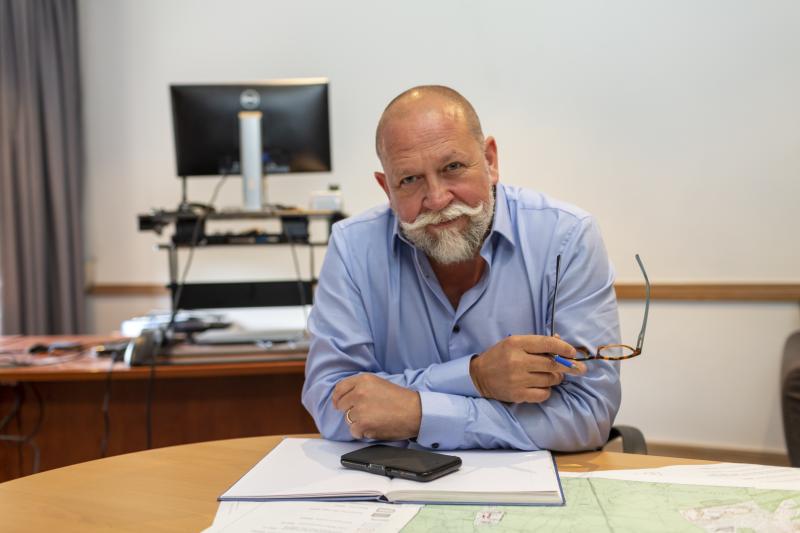4 minute read
Sigma Strategic Land (SSL) is in conversation today with Tim Searl, both Managing Partner and Founding Partner of Searls Land. Tim is widely recognised as an industry expert and has worked in the residential sales and development markets throughout the South East of England since 1982. Tim has a wealth of knowledge and experience that encompasses all aspects of the residential property and development sector. Having been in the property industry in one way or another since the very start of his career, SSL was keen to catch up with Tim to find out more about his journey, his views on the land market post-Brexit and Covid, the challenges facing the housebuilding sector and his advice to those considering a career in the industry…
- How did you come to join the property industry?
My father was an architect and when I left school in 1981 with no BIG PLAN, he didn’t want me to be a directionless drifter (his words…RIP) so he had a word with a few of his Estate Agency mates, one of which was kind enough to give me a job as a trainee with an annual salary of £2,500. After a year of back-office work, I was let loose on the public and sold my first property in 1982 for £7,000. The rest, as they say, is history.
-
Tell us a little about Searls Land and how it came to be?
Searls Land began trading in January 2010. Prior to this from 1999, I had been heading up the Land Department for a SW London Estate agency. In December 2007, my employer sold their agency to Hamptons International, and I became “Head of Land” for the South East region. 2008 saw the beginning of the Global Financial Crash, described as the “most serious financial crisis since the Great Depression”, and as a result, it will surprise no one that my time with Hamptons was not filled with successful land transactions. In the middle part of 2009 I was encouraged to think about setting up my own Land Agency. The rationale behind my decision to do so related to my experience of working through previous recessions and experiencing the positive market conditions that followed. Although market conditions did improve between 2010 and 2015, the deep scars left by the financial crash meant that caution was the buzzword in the boardroom and therefore, progress was slow. In our 12 years of operational business, we have had to overcome various challenges including the early and unquantifiable effects of our decision as a country, to leave the EU, a broken planning system and most recently, a global pandemic. Despite these challenges we have grown in number, gained valuable experience and knowledge, (we now know what the word “Furlough” means) significantly improved our market share and built a positive reputation for honesty, integrity, and service delivery.
Dealing in both immediate and strategic land markets, to date we have been instrumental in the acquisition and or sale of somewhere in excess of 6,000 plots throughout the South of England. A statistic both the company and I are proud of.
-
What do you most like about your job?
I have always loved the buzz of the deal. Seeing what could be rather than what is, negotiating an agreement between buyer and seller, living the excitement of the planning gain, and finally, watching the positive change to the urban environment. I am also partial to a bit of corporate entertainment!
-
How have you found the land market during Covid and what are your thoughts for the future as we now look to a post-Covid world?
The Covid years have been surprisingly positive. Looking back at my career in the land sector and the wider property market, when significant events have occurred, people and businesses invested in the industry tend to slow or stop all transactional business until they are comfortable to continue. In early 2020 my thoughts of Covid and its possible effects on our business were quite negative. Having rebuilt our pipeline of transactional business in the years following the Brexit vote, I initially thought the worst, however, Covid was different. Rather than being a single event on a specific day, the global pandemic with all its implications evolved over a period of months giving us all valuable time to assess the possible effects on our businesses and provided the opportunity to implement change where required, as opposed to simply stop trading. Whilst the need and ambition to build more new homes has not been curbed, the operational pace of the land market has been affected and remains a frustration.
As we start to emerge from a world upended by sickness, worry, furlough schemes, national lockdowns, face masks, vaccines, policy disagreements and parties at No. 10, I feel confident the UK land market and all its contributors are well placed to continue the delivery of residential building land and much needed new homes and we at Searls Land intend playing our part.
-
Housebuilding is always facing many challenges. Post-Brexit material supply issues and labour shortages are causing sharp increases in build costs. Planning application and planning appeal delays are commonplace causing much uncertainty as house builders try to plan production. How are these and other factors affecting the land market?
As the question above highlights, housebuilding and housebuilders face many challenges. The post Brexit increases in build cost will affect all volume housebuilders in some way however, these costs will simply be factored into their appraisals when arriving at land values. As build costs increase one of two things will result, land values will reduce and/or profit margins will reduce. The need and ambition to buy land, will not and has not diminished. That said, where smaller developments are concerned, we may see more viability issues creep into the market resulting in less small scale, local development.
Planning application and planning appeal delays are a constant frustration and have been for several years however, these delays simply increase the demand for building land as PLC and regional housebuilders need to operate at certain levels of production in any given year. If housebuilders do not have enough land coming through the promotion & planning system to satisfy their production targets, they will look to buy consented land from elsewhere which is why we are currently seeing high land values.
We have a planning system littered with inconsistencies, political agendas and bad decision making. In addition, there is a national (public) disagreement over the Governments housing numbers, where (nationally and locally) houses should be built, and what are appropriate, private to affordable housing ratios. Simplistic, I know, but there are more reasons why houses do not get built than reasons why they do get built and while that remains the case, the national housing shortage will not diminish, the land market will remain buoyant and house prices will continue to rise.
-
You obviously have a strong team around you; what do you most value in your people?
Easy, I value their work ethic, their loyalty and their friendship and I will always place their interests above my own.
-
What are your career highlights?
My career started in 1981 so I have been involved in property/land for 41 years and have seen a lot of change particularly in respect of technology, as an aside, I foresee a great deal more technological change to the industry and our homes over the next few decades. Back to the career highlights question. There really isn’t one specific event that I would pick out but when I think back over my career what sits at the front of my mind are all the fantastic people I have met and the weird and wonderful story’s I have in my repertoire.

- What advice would you give to someone considering a career in the housebuilding industry?
Firstly, there are more losses than wins so be prepared to stand up, dust yourself down, and go again. Secondly, if you recognise you are not busy, something is wrong! Thirdly, housebuilding is a people industry. It is as much about who knows you as who you know, so my advice is to network, network, network. And lastly, learn how to play golf.
Thank you to Tim for making such a valuable contribution to our SSL Q&A Series.
Back to News
